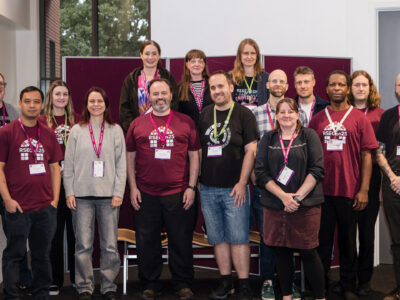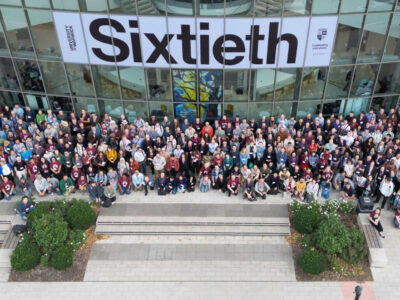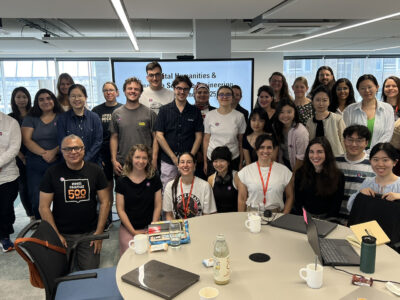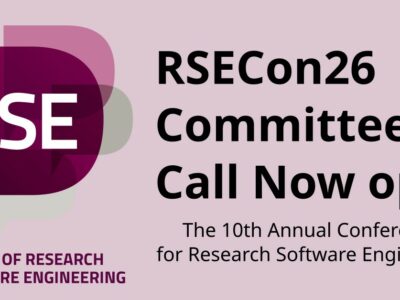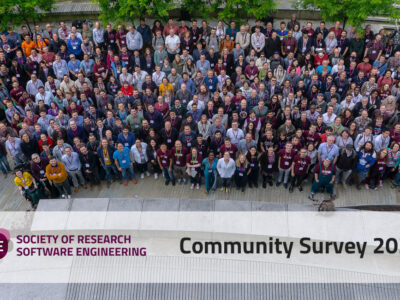2023 Trustee elections and candidate statements
The Society of Research Software Engineering is holding its annual Trustee elections for 2023. All valid members at the moment of polling opening will be emailed detailed instructions to vote and their personal voting token. Voting will close 10:00am BST, Tuesday 5 September.
Candidate statements
We thank every candidate, seconder and scrutineer for their dedication to the community. Please read the candidate statements carefully and cast your votes appropriately.
Candidates standing (in random order):
- Mary Chester-Kadwell
- Peter Schmidt
- Fliss Guest
- Mike Simpson
- Stef Piatek
- Jim McGrath
- Lyndsey Ballantyne
- Twin Karmakharm
Mary Chester-Kadwell, University of Cambridge
Why do you want to be a trustee of the Society?
I work as a senior developer/lead RSE and I’ve been a software engineer for about nine years in total after shifting career. Previously, I worked variously in conference organising, science publishing, archaeology, community heritage and museums. My route into RSE has been a bit unconventional, but this seems to be a more common experience amongst my colleagues in humanities and libraries/museums. With a wide range of cross-discipline experience I thought I might have a lot to contribute to the Society at this point in my career, and that I would welcome an opportunity to grow my skills and meet people in the wider community.
As well as supporting the core roles of the Society, I would like to work on widening participation in the Society for RSEs and researchers working within arts & humanities (A&H) and galleries, libraries, archives, museums (GLAM). For example: improve understanding of the RSE concept and recognition of the Society’s existence amongst these groups; broaden the activities of the Society to be more inclusive of the particular types of RSE practised in these areas; encourage cross-discipline conversations and collaborations for research and teaching/learning RSE. I am particularly interested in how RSE practices can be taught effectively to those from a non-STEM background.
This is a great time to be tackling this as the AHRC has finally recognised that RSE occurs in A&H too and research libraries are now committed to recognising the Technician Commitment. The demographics of the A&H and GLAM groups can be somewhat different to the traditionally science-focussed RSE community and so this will also need some additional thought in the diversity and inclusion area.
Which of the current activities that the Society engages in are you best suited to help with?
There are many areas I would be happy to contribute to that might come under the broad umbrella of widening participation and building community – such as conference and events, diversity/inclusivity, communications and membership. I’m happy to pitch in where help is needed. As an experienced web dev/sysadmin I can also roll up my sleeves for infrastructure too.
What can you bring to the role of trustee that would be useful in running the Society?
I’m organised and good at communicating, both in person and on the page, which I think are generally useful skills for a trustee. I used to organise international science conferences, edit academic publications and even work with members of the public in a pre-RSE life, all of which have given me a range of useful transferable skills. I am also a co-organiser of the Digital Humanities Research Software Engineering Summer School and have lots of teaching experience. I was a volunteer for RSECon22 so I’ve got some behind-the-scenes experience there too.
What do you want to get out of acting as a trustee for the Society?
Two things spring to mind – firstly, gain some experience in areas I don’t normally encounter in my everyday role, perhaps like governance and project or people management, and secondly to learn from more experienced members of the community and enjoy teamwork with the group of trustees.
Peter Schmidt, self-employed, Podcaster
Why do you want to be a trustee of the Society?
In the ten years or so of its existence, the Society has worked hard to get software engineering in research recognised as a valued contribution to research and scientific work and output.
Thanks to this effort we have seen a lot of progress in terms of RSE roles
in universities and research centres. The Society has also been a role model for similar organisations outside the UK.
However, being a charity means it cannot run on autopilot.
The Society needs volunteers to continue its important work and mission.
Personally, I have significantly benefited from the Society’s efforts, starting with finding a job as RSE at UCL through the Society’s Slack channel to the strong support I received when creating the Code for Thought podcast in 2021.
I decided it is time to roll up my sleeves and give something back. A lot has been achieved in the last 10 years. But there still is a lot to do. Research software, and the people who create it, are still not fully recognised. Therefore, it is important that the Society continues its mission to shine a light on the work we do and influence where it can. To that end, I look forward to work with you and the wider community as a trustee.
Which of the current activities that the Society engages in are you best suited to help with?
Communication & Publicity
What can you bring to the role of trustee that would be useful in running the Society?
Communication plays an essential role in the Society’s effort to strengthen the existing community and reach out to allies and partners beyond.
It is this area, where I consider my skills best put to use as trustee.
In recent years, I had the opportunity to hone my communication and networking skills through building a community podcast. As part of that, I worked closely with different members of the wider RSE community in and outside the UK.
In addition to that, I believe that my experiences as former trustee and chair of charities (HIV) as well as years as team lead/manager of software teams will bring value to this role and help shape our next communication and publicity strategy and plans.
But all this is rather dry. So let me just add, that it is great fun to work with and for this Society. We are an amazing community through which I have met so many inspiring and great people. And in that spirit I hope that the next 10 years will achieve just as much (or more) as the first and I’d love to be able to contribute to it.
What do you want to get out of acting as a trustee for the Society?
Following from previous sections: I have already benefitted immensely from this community. Seeing this community grow further and be able to contribute to it would be a very rewarding experience for me personally. In addition to that, the work as trustee will help me get to know many members, old and new, much better and find out about all the exciting work they do.
Fliss Guest, University of Exeter
Why do you want to be a trustee of the Society?
I have been a member of the Society and its community for just over a year now, and it is the most welcoming and supportive community I have ever had the privilege of being a part of. I am putting myself forwards for the role of trustee primarily to give back to the community and contribute to the ongoing growth and development of the Society. Given I am extremely passionate about the RSE role and what it stands for, I could not pass up the opportunity to play a part in shaping our community’s direction.
Which of the current activities that the Society engages in are you best suited to help with?
As a current member of the Society’s EDIA & Role Diversity Working Group, I believe I would be best suited to help with the Society’s diversity, inclusion and accessibility activities. I will also be acting as a volunteer at the Society’s annual conference this year, which should provide me with some insight into planning and delivering the conference. In addition, I consider myself a people person and avid organiser, so would relish the opportunity to help with any related activities, including outreach.
What can you bring to the role of trustee that would be useful in running the Society?
Given I am a current member of the Society’s EDIA & Role Diversity Working Group, I already have an understanding of the activities the Society is undertaking in this area, along with some exposure to the Society’s processes. I am also a member of the RSE South Webinar Team, so have experience organising and advertising events, which I hope to build on as a volunteer at the Society’s annual conference this year.
What do you want to get out of acting as a trustee for the Society?
I would like to develop my personal and professional skills, particularly the diversity of my skills, as well as widen my network. It would be a brilliant opportunity to meet more people within the community. I would also like to get a better understanding of how the Society works, along with how best to build a community, enabling me to build a vibrant local network of RSEs at Exeter.
Mike Simpson, Newcastle University
Why do you want to be a trustee of the Society?
I never really knew what I wanted to be when I grew up, but in 2017, at my first RSE conference, I discovered that I was already doing the job of an RSE in all-but-name. I later became an official RSE and contributed to the founding of the Newcastle RSE team. I have tried to be an active member of this community ever since, speaking at several conferences and being on the conference committee for the events in Newcastle (2022) and Swansea (2023).
I love being an RSE and I would like to give back to the RSE community, which has been such an inspiration to me. I want to help the Society (and the wider community) to grow, and to do my part to help advocate for and improve the state of RSE in the UK – in particular trying to improve working conditions and career opportunities for RSEs. I feel I have expertise that would be useful to the Society and hope to gain some useful skills and experience in the process.
Which of the current activities that the Society engages in are you best suited to help with?
I feel like my experience (see below) would make me ideally suited to be part of the Society’s Communications & Publicity outputs, as well as enabling me to contribute to Web Content and Membership & Outreach. I would also be happy to work on expanding the Society’s EDIA goals and to liaise with future conference committee(s)/chair(s).
What can you bring to the role of trustee that would be useful in running the Society?
As Publicity Chair/Co-chair for the 2022 and 2023 conferences, I have experience of Communications & Publicity, including using the Society Twitter account/Slack to promote the conference and running the conference mailing list. I do a lot of writing, including blog posts for the Society and other partners such as the SSI. I’ve also been acting as the publicity/social media manager for the Newcastle University RSE team. Finally, I’ve been involved in managing the Newcastle RSE team and, obviously, have worked as part of a committee in the past, delivering on the goals and responsibilities of Poster Chair and Publicity Chair for the conference.
As a long-term member, I am familiar with the Society and its goals/values, as well as with what it is like to be an RSE. Because of my experience, I am familiar with many of the challenges faced by RSEs (and by RSE Team Leaders), and I am passionate about advocating for this community and helping it to thrive.
What do you want to get out of acting as a trustee for the Society?
I am hoping that being a trustee will give me new responsibilities, skills and experiences that will help me to grow as an RSE (and RSE leader), as well as creating new opportunities for me, professionally. But, I’m mainly interested in giving back to this community and helping it continue to grow and evolve.
Stef Piatek, University College London (UCL)
Why do you want to be a trustee of the Society?
I stumbled from working as a clinical bioinformatician in the NHS to a role in the RSE group at UCL, and feel incredibly fortunate that I’ve found a profession that balances research with technical improvement and sustainable development. I have benefited from the RSE movement and would like to give back. It was heartening to see how the community pulled together during covid and I’m keen to help expand the society (in members and in recognition) and improve our diversity. I’d like to help the RSE society continue its work on shaping the development of the profession and enabling more people to have a supportive career that improves research.
Finally, within our department I’ve really valued our community and from a more selfish perspective I’d really enjoy working with others on a shared vision for the wider society.
Which of the current activities that the Society engages in are you best suited to help with?
I’d be keen to work on Equality, Diversity, Inclusion and Accessibility (EDIA) or Membership – though it’s been nice to hear how collaborative the roles are and am happy to help wherever there is the most unmet need.
I’m a Mental Health First Aider, have been a Samaritans listener volunteer for a bit over 10 years and am a Wellbeing Champion for my department. All of these roles involve active listening, collaboration and impact on EDIA so that feels like a natural extension. I’d like to ensure that we’re making an environment that is welcoming for all potential members by identifying and reducing barriers. I think both of these roles would be collaborative, engaging with different areas of the RSE community than I normally would be exposed to.
What can you bring to the role of trustee that would be useful in running the Society?
I can bring some experience with charity work as a deputy director of Central London Samaritans. As a student I acted on the hilarious idea to create a vegetable appreciation society at Imperial College, though more seriously, I’ve acted as president, treasurer and secretary across different clubs as a student. From these I can bring active listening skills, helping build consensus and promoting engagement from members.
After my PhD I transitioned into the NHS via the Scientist Training Programme – a clinical registration scheme. I joined and then co-chaired the London Healthcare Scientist Trainee Network, where I represented scientists in the training scheme in our region. Over this period I co-ordinated and wrote our monthly newsletter, as a team we organised bi-annual peer-training sessions and talks from healthcare scientists and fed into strategic meetings within the healthcare scientist network.
In my last year of working in the NHS I represented the trainees and the bioinformatics profession in the Workforce Development Group of the Association for Clinical Genomics Science, the professional association for scientists working in clinical genomics. Before I moved from the NHS to UCL, I worked on building up a complete picture of our workforce and the career progression in different regions and specialisms.
What do you want to get out of acting as a trustee for the Society?
I’ve done EDIA training from volunteering, work (NHS, UCL and recruiting training) but would like to improve our strong base here. I get a lot back from volunteering roles personally, and I’d also like to build up some working experience in this area. I found working on shared goals with people outside of work in my previous representation and workforce roles in the NHS to be incredibly rewarding and look forward to the possibility of being a trustee.
Jim McGrath, Self-Employed/Freelance
Why do you want to be a trustee of the Society?
As an early member of the RSE community I have gained a lot from the work of the Society, and have given back my participating actively. I recently left direct RSE-related employment but am keen to both keep in touch with, and continue to support, the RSE community. Standing as a trustee is an obvious way to achieve both of those goals.
Which of the current activities that the Society engages in are you best suited to help with?
Trustee and Web Content lead or second
What can you bring to the role of trustee that would be useful in running the Society?
As a self-employed contractor with a broad portfolio, I have a great deal of flexibility in both my available time and my thinking. I have experience of both sitting on and chairing committees, and supporting others. My previous employment has included roles requiring the interpretation of complex regulations to provide a service within legal frameworks. I’m very personable and work well with other, as well as quickly adapting to new tasks.
What do you want to get out of acting as a trustee for the Society?
As previously mentioned, I see acting as a Trustee as a great way to keep in touch and grow my network within the RSE community while I’m not full-time employed as an RSE or in a similar role.
Lyndsey Ballantyne, Software Sustainability Institute/University of Southampton
Why do you want to be a trustee of the Society?
After starting in my role as RSE Community Manager for SSI in March 2023 I have been working with the Society as the Logistics Chair of RSECon23. I am keen to continue working closely with the trustees and intend to be the Logistics Chair for RSECon24.
Which of the current activities that the Society engages in are you best suited to help with?
Conference and Events, Communications and Publicity working group.
What can you bring to the role of trustee that would be useful in running the Society?
My organisation skills and positive, proactive attitude means I am great at keeping all parts of a project moving and on schedule. I excel at motivating and supporting others to achieve their goals and would use these skills to work with other trustees/conference committee members to support the Society’s activities and members.
What do you want to get out of acting as a trustee for the Society?
As a Community Manager for RSE’s I would like to learn from people who work in this field and be at the very heart of the community and the people who support it.
I would like to see myself as a hub of knowledge for RSE’s and feel that being a trustee of the Society would ensure I have the most up to date information about what is happening in and for the community.
Twin Karmakharm, University of Sheffield
Why do you want to be a trustee of the Society?
Having transitioned from an RSE-like role to an actual RSE, I really appreciate the value of having a technical role within research that is properly recognised by academia. Now that I have the capacity, I would like to help contribute to the RSE Society that’s given many of us our professional identities and brought us all together.
I’ve enjoyed my work as an RSE and have seen the impact our work can have on research and how rewarding it can be. This is why I’d like to help where I can to encourage more people to choose a career as an RSE. In particular, I would like to make the role more attractive by helping to raise the profile of RSEs, ensure RSEs have a proper career path, and make the RSE role and RSE society as a whole more diverse and inclusive.
Which of the current activities that the Society engages in are you best suited to help with?
With my current set of skills, I feel I would be able to best help with:
– Organisation of events for the society, including the conference.
– Development and maintenance of the society’s technical infrastructure.
– Creating and delivering outreach activities/initiatives for the society.
What can you bring to the role of trustee that would be useful in running the Society?
Organisational
Project management is a core part of my role and since stepping up as a senior RSE, I’ve also been responsible for coordinating project enquiries and project allocation for four team members. I was responsible for organising and coordinating Sheffield university’s first 3D in Health conference which had over 100 attendees.
Leadership & Collaboration
I’m currently leading a team of two RSEs working on an open-sourced web-based text annotation software (Teamware) which has now been delivered and is in use in five research projects.
I’ve taken the initiative to create an introduction deep learning one day workshop for researchers when existing training materials were insufficient. It has since been delivered to over 500 researchers and resulted in the creation of R language version with the collaboration of another RSE.
Public-facing
I have delivered deep learning workshops externally at five universities and to national organisations such as the N8 and UK HSA. The largest class was delivered to over 120 undergraduate students with the help of 4 teaching assistants.
During my time as lead of the University’s Virtual and Augmented Reality lab, I led on the creation of “The Crash Landing” VR experience in support of Women in Engineering and was also the lead developer of another VR experience “No Greater Fear than the Unseen”. I’d been extensively involved in demonstrating these experiences to the general public within Sheffield.
Technical
My recent projects have involved the development of web applications, and lead me to gain a good understanding of technologies involved from frontend to deployment and including CI/CD automation. I also have an interest in machine learning and have been helping to support researchers to migrate their ML workflow to the HPC with my involvement in the JADE cluster.
What do you want to get out of acting as a trustee for the Society?
I feel that being a trustee would be a great way to build lasting connections and gain a good reputation with members of the RSE community. Having only recently come into a leadership role, I’d like to gain experience leading community initiatives and be involved in helping to make strategic decision that will improve the status of RSEs as a whole.

